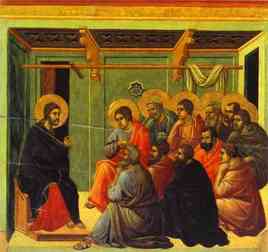
Sermon by St. Augustine the Bishop
This Little While is the whole duration of this present world. In the same sense this same Evangelist saith in his Epistle: It is the last time. The words: Because I go to the Father: refer to the first clause of the text, thus: A little while and ye shall not see me, because I go to the Father. Hence we should not connect them with this latter clause: And again a little while, and ye shall see me. For his going to the Father was about to bring to pass this, namely, that they should see him no more. And on this account he is not to be understood as saying that he was about to die, and that, until he should rise again, he would be withdrawn from their sight; but rather, that he was going to the Father; which same he did when (after he had risen, and had manifested himself to them for forty days), he ascended up into heaven.
It was therefore to them which were then looking on him in the flesh that he said: A little while, and ye shall not see me. A little while, and they would no longer see him as mortal man, such as they saw him to be whilst thus speaking, because he was about to go to the Father. But he added: And again a little while, and ye shall see me: and these words are a promise to the Universal Church, just as are those others: Lo, I am with you alway, even unto the end of the world. Our Lord delayeth not his promised coming. Yea, again a little while, and we shall se him. Yea, and when we thus shall see him, then shall we ask for nothing more; for no desire will be unsatisfied, and no riddle unsolved.
This Little While seemeth a very long while to us now, while as yet it is still going on, but when it is ended, we shall realize what a little while it was. Let not our joy, then, be like that of the world, whereof it is said: The world shall rejoice. A woman when she is in travail hath sorrow, and yet, while, as hitherto, our gladness is still coming to the birth through throes of sorrow, let us not be altogther sorrowful, but as the Apostle hath it: Rejoicing in hope, patient in tribulation. A woman, when she is in travail hath sorrow, because her hour is come; but as soon as she is delivered of the child, she remembereth no more the anguish, for joy that a man is born into the world. And so will it be with us. And with that let me end my sermon. For the next passage is one of extreme difficulty; nor is it possible to treat it briefly, if, by the will of God, it is to be treated satisfactorily.




